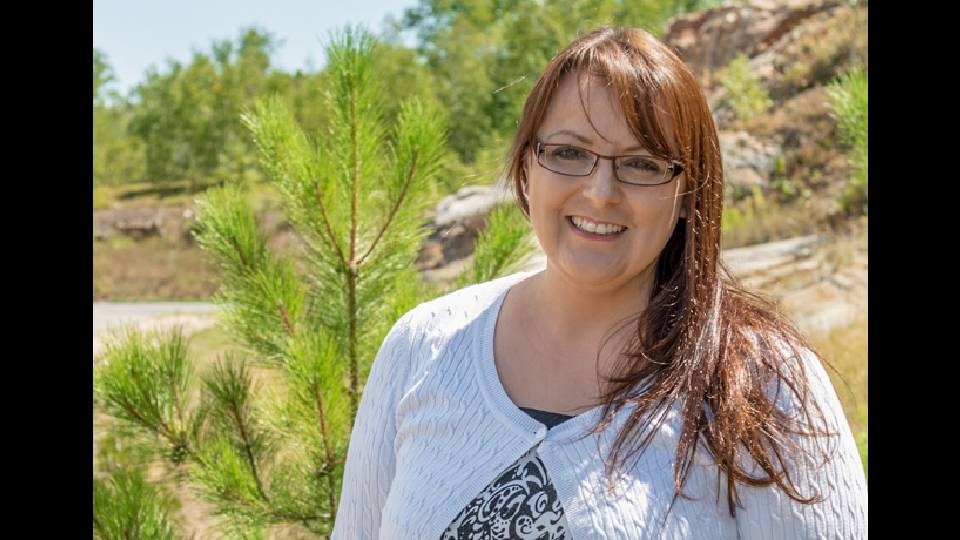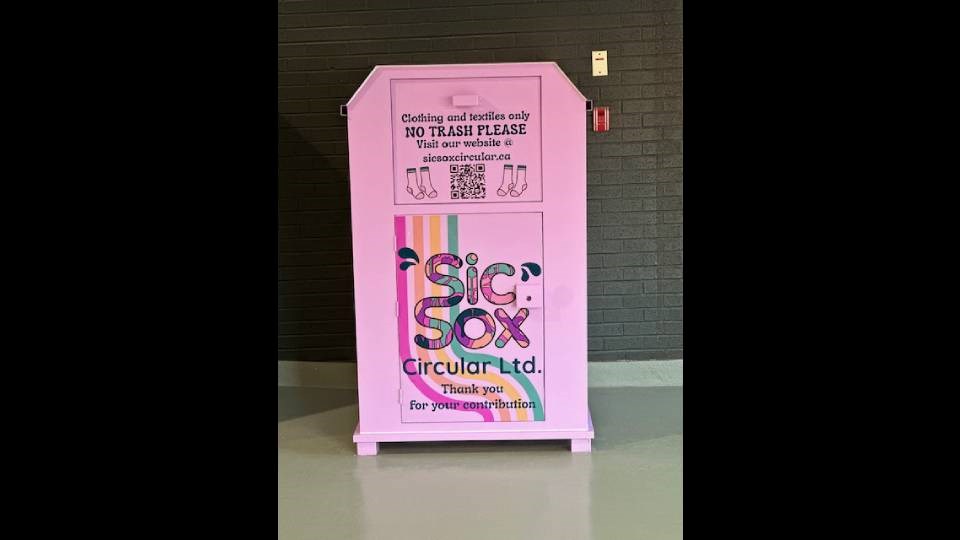The pile of old, threadbare socks in Doris Mitchell’s closet was growing bigger and bigger.
For years, she had donated her unwanted, gently used clothing to thrift stores for reuse. But socks presented a dilemma.
“There were laundry baskets full of old socks that nobody wanted to wear anymore,” Mitchell said. “Over the years things had collected, and it was just taking up so much space.”
Her forlorn foot warmers seemed destined for the landfill. But mindful of the environmental cost, Mitchell couldn’t bring herself to just toss them in the garbage. Instead, she came up with her own solution.
Last fall, Mitchell and her oldest son, Jerret Paquette, launched Sic Sox Circular in the community of Brunswick House First Nation, near Chapleau, where they plan to repurpose unwanted textiles into a new type of home insulation.
Colourful metal collection boxes bearing a motif designed by Paquette are placed in communities across the North where people can drop off their unwanted textiles.
Clothing, bedding and pillows, industrial textiles, shoes, handbags, and even stuffed animal toys can be dropped in the bins, which are emptied once a week when donations are transported to the recycling facility at Brunswick House.
Items that still have lots of life left in them will be resold through the Sic Sox Thrift Store in Chapleau and online. The rest will be sorted by material and shredded using European-made equipment designed for the purpose.
Watch below for a tutorial on how textile recycling works through Sic Sox Circular:
Since launching, donation boxes have been set up in 18 communities, and another 40 are ready to ship out, Paquette said. Conversations are ongoing with additional communities to expand the network.
“Every day we’re getting more and more bins,” Paquette said. “Hopefully, we’ll get to our goal of 60 within the next couple of weeks, and then we’ll be able to have fully serviced northern communities.”
Sic Sox has so far hired four people — three full time and one part time — to handle transportation, merchandising, and marketing, and they hope to add another three people this year.
But the company also welcomes community participation through its Very Important Volunteer (VIV) program, which engages youth and others in the community to contribute their time and skills, whether it’s through modelling clothing for the website, digital uploading, making signs or more.
Mitchell said it’s important to her that the company has strong Indigenous representation, on its face and in its values.
“I’ve created successes in my own life, and I just wanted to continue doing that for other people,” she said.
“So it’s not necessarily about me now. It’s about the legacy that can be created for the future and my community.”

Yet Mitchell’s personal legacy is a significant one.
When not devising solutions for the North’s textile waste, Mitchell practices medicine full time as a family physician, in her community and doing locum work through the region.
In 2012, after completing her residency, she returned home to a community that hadn’t had a physician in seven years, and the need was desperate.
Over the nine years she ran her practice there, 100-hour work weeks became the norm. Mitchell would work 12 days straight — eight of which were on-call, 24-hour shifts — while juggling two walk-in clinics per week. During one two-year period, she estimates she saw 11,000 patients.
With no down time to reset or relax, the frantic pace caught up with her. Burned out and physically ill, Mitchell quit her job and decamped to Manitoulin Island where she joined the Mindemoya Health Centre.
Leaving her home community was “devastating” — “almost like the death of a dream,” she said — but she resolved to return.
“I just had to learn the lesson that I’m not the solution,” Mitchell said. “My working harder isn’t going to fix the needs of everyone, and I can’t burn myself out and break myself to do it.”
Making good on that promise, she did return, healthier and stronger, and ready to give back to her community in a different way.
“You can build capacity within the community and actually touch on the social determinants of health by bringing income and by bringing some security and learning and knowledge and skill,” she said.
“So I thought if I could do that, then regardless of what happens in my medical career, I’ve made a difference.”
With Sic Sox donations now coming in weekly, research is ongoing to figure out which textiles have the properties that make them a good fit for a blow-in insulation.
Mitchell said the company is working closely with the materials engineering department at St. Lawrence College in Kingston to test different materials in combination with boric acid, creating a mixture that would provide beneficial insulating properties.
“This has been done before with trees, paper, bamboo, jeans, cotton, wool in other companies across the world,” Mitchell said. “But there’s nothing like that currently right now in Canada where it’s being produced here.”
Synthetic products like nylon or rayon haven’t been tested in a mixture before, she said. So researchers will be blending synthetics or semi-synthetics with biological cellulose to see how they rate.
“We don’t know how much additional mix can be added to the product and still be able to maintain the standard, if any,” Mitchell said.
Once they develop a solution, they’ll then be able to seek out end users for their product, to be marketed as Sic Sox Thermal.
Any synthetic materials that can’t be used will be packaged up for use outside the Sic Sox Circular market, she added. Additional textiles will be reused to make a Sic Sox brand of socks and mittens, branded as Sic Sox Design.

To date, Mitchell and Paquette have funded the venture with their own money, although they are seeking out grant funding to help with development expenses.
They’re also selling advertising, on the donation boxes themselves and on the website, to generate some revenue, which Mitchell said will be folded back into the business.
When people scan a QR code on the donation boxes, it takes them directly to the website where people can see advertisers’ messages and learn more about those Northern Ontario businesses.
Mitchell is projecting it will take about two years before the company is generating a profit, but once it does, Sic Sox has committed to donating 10 per cent of profits back to programs that support efforts around Missing and Murdered Indigenous Women and Girls, and gender equality.
Five years out, if things are operating smoothly, she sees this as an opportunity to franchise the model out to other Indigenous communities, so they can manage and recycle textile waste in their own regions.
Mitchell conceded the plan is a big one, with a lot of moving parts that all have to come together before it’s successful. But she’s determined to make it work.
“That's what I'm going to prove over the next year or two, is that it can work. People will buy in; they will want to participate,” Mitchell said.
“I believe people will do the right thing with their textiles if given the opportunity and you make it convenient for them.”